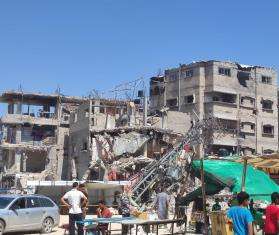Brussels, September 6, 2010—As finance ministers from the European Union gather in Brussels for a formal meeting to discuss the establishment of an EU-wide financial transaction tax, international medical humanitarian organization Doctors Without Borders/Médecins Sans Frontières (MSF) calls on them to dedicate a proportion of the receipts from any fundraising mechanism to global health.
"The EU is in a unique position to act here," said Dr. Tido von Schoen-Angerer, Director of MSF’s Campaign for Access to Essential Medicines. "The European Council has previously called for a financial transaction tax, and earmarking some of that money to health would avoid unnecessary death. It would be unacceptable for EU leaders to simply look the other way when the situation of health funding is in such a critical condition."
Many lifesaving interventions could be scaled up to reach more patients if additional resources were diverted to health. But donors that recently bailed out the financial system are now claiming they cannot commit more funds to saving lives. This is leaving considerable gaps in the financing of key organizations like the Global Fund, as some donors, notably EU countries like Germany, Italy, and Spain, renege on previous commitments.
"For MSF teams, the list of unmet needs is endless," said Christopher Stokes, General Director of MSF in Brussels. "Ten million people are in urgent need of HIV treatment, maternal and childhood health services, including vaccinations, are insufficient, millions of young children are cut down by the scourge of malnutrition. Leaving these needs unaddressed is a political decision.”
"At the moment, the poorest are paying the heaviest price for the financial crisis, and this meeting is an opportunity to redress that," said Dr. von Schoen-Angerer. "We need predictable resources, instead of today’s volatile donor funding. We need sustainable, long-term contributions, but instead we’re now seeing some donors turning back on previous pledges, which means patients are being shut out and effectively condemned to die."
The World Bank recently estimated that US$12.5 billion is needed annually to scale up effective nutrition programs globally. The World Health Organization reports that an additional $37 billion needs to be spent on global health, every year, in order to meet the health-related Millennium Development Goals. These estimates do not include the cost of researching and developing better diagnostics, medicines, and vaccines, which are needed for tuberculosis or the most neglected diseases like Chagas, sleeping sickness, and kala azar.
The idea of financial transaction taxes (FTTs) is not new, and indeed one such example already exists for health—the international agency UNITAID finances programs thanks to a tiny tax on airfares. FTTs have recently received unprecedented international attention. The International Monetary Fund recently deemed them feasible. Recently, a number of countries have proposed a "Global Solidarity Levy" on currency exchanges where all funds raised would go to fill the health and development gap. According to the group’s estimates, a currency transaction tax of 0.005 percent on the four largest currencies could result in $33 billion a year.


